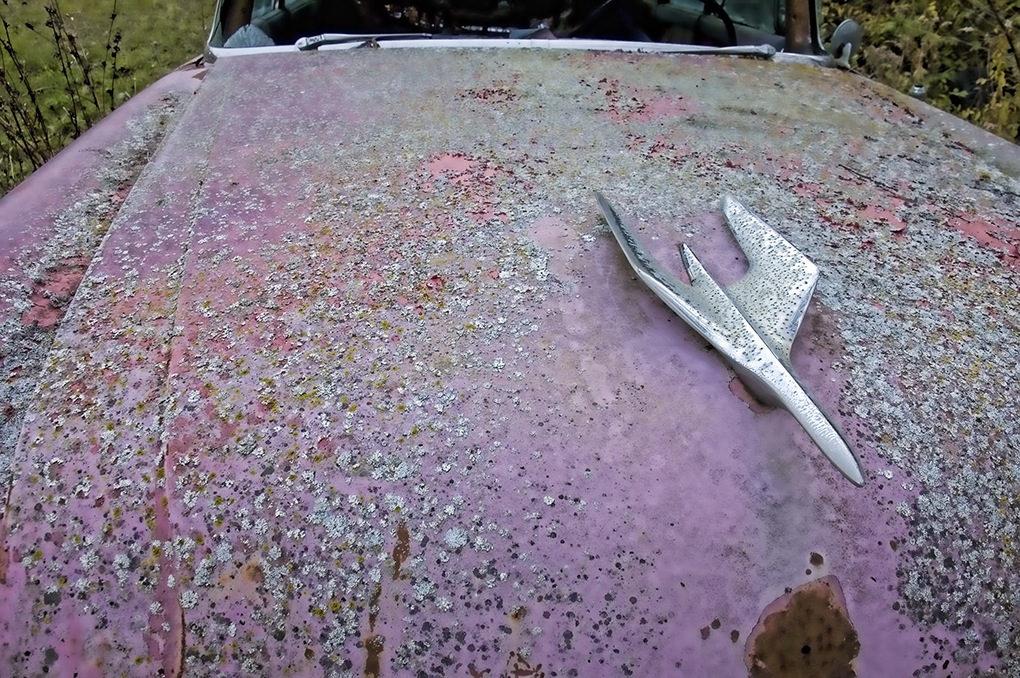Light of my life, fire of my loins. My sin, my soul laments Humbert Humbert. The recollection of Lolita draws Nabokov’s unreliable narrator far back in time as the middle-aged man, now grown old with memories, paints a portrait that pleads for pity and argues that his judges should look at this tangle of thorns.
Such are memories – convenient, self-serving, and self-justifying. Useful, but never objectively true. Nor can they ever hope to become true, having lost that virtue with a drive off the showroom floor and onto the pothole and tar-ridden streets of a human mind; there to break-down with age or neglect, to collect dings and scratches, to take damage from collisions with other memories, to change hands, become obsolete, be parked in a vacant field, grow a patina of lichen, rust and sun-rot, and to eventually be forgotten.
Most memories live this arc of existence very briefly, dying of defects in the production line. I’d share one of these with you but I’ve forgotten them all. Perhaps memories of dreams are among the most common victims. There are other memories which appear fleetingly and then are gone again, only to re-appear at some common invocation. These may attach themselves to certain odors or events: the waft of a casserole or a snow-covered morning. The most subtle of these might even provoke experiences of déjà vu. Among the more durable and reliable are those memories which are driven for work and those which are driven for pleasure. Both are ever at the foreground of our attention and these highly practical memories may be those with which we most closely identify… these are the memories we imagine to be the most true reflection of self. This is to name just a few grand types and I’m sure you share my sense of the profound variety of memories, being the proud owner of your own collection.
Yet there is one class of memory of particular interest to me for its vital, yet, mysterious role. It is those memories which sit on the seat of the soul and drive us. Memories so deeply visceral and fully fitted to the form of consciousness that they don’t appear to us as memories at all. In fact, they are forgotten.
Do you remember the moment that your life began? I don’t mean to ask if you recall the events of your physical birth, though such a moment should be highly memorable. Rather, do you recall that moment when you became aware of being alive? There was certainly that day when you learned to correlate your sense of sound, of smell, of sight, of touch, of hunger, of fear. Which memories coalesce to form your current attitude toward human torture? Or your sense of direction? The certainty that you have of being a morning person or a night person? And somewhere you have memories of how to recognize love or its brutal opposite, indifference. How about any part of the long series of experiences which formed your attitude toward driving in heavy traffic? And your predilection for religious practice and belief? There are memories behind all of these. Forgotten memories.
Beyond all of these are ancient memories, the formation of which we’ve not personally experienced, yet are equally part of our being. Material, chemical, genetic memory, aeons in the making. We are beings so fully and utterly composed of data stored in memory that one might say we are nothing more than massive collections of pulsing, undulating, copulating memories. In the words of Russell Edson, via Douglas Hofstadter, we are teetering bulbs of dread and dream.
Yet the profound subtlety of all that we’ve forgotten may tempt us to write-off as farce, fallacy, or even sin, some very basic aspects of who we are and how we diverge across a broad spectrum of variation. When these forgotten memories collide with more modern or otherwise conflicting memories we may damage ourselves and others. This collection of memories called human life – the oldest and most majestic of its kind – can have such a profound yet hidden impact upon the mind of each individual as to turn even an otherwise gentle and wise elder into a predator of the natural sexual memory complexes of a child.
And so we’ve come full circle and landed again on Lolita. Lo-lee-ta; the tip of the tongue taking a trip of three steps down the palate to tap, at three, on the teeth. Lo. Lee. Ta.
If we remember nothing more profound may it be this one thing: that we are the sum of many forgotten memories. The Red House Painters croon:;have you forgotten how to love yourself?
— —
Notes:
- IMAGES – All images herein courtesy of Rubber@Road and used with permission. Thanks, Jeff! And prints can be purchased at Jeff’s online store. I’d like to put this Pink Packard collection on my office wall.
- RESOURCES – Special thanks to Vladimir Nabokov (and to my friends here on D&S who encouraged me to start reading), to Microsoft Bing and Wikipedia, Douglas Hofstadter’s “Gödel, Escher, Bach: An Eternal Golden Braid”, and to many anonymous authors of books on theories of mind, both scientific and philosophical, which over the years have deeply enriched my formation of memories — though I do not blame them for any utter misunderstanding on my part, and finally to all of my colleagues here on Doves & Serpents: your phenomenal ability as writers and editors is an inspiration to me.
- ABOUT – Cipher on a Wall is a weekly column and forum here on Doves & Serpents which explores the realm of mind, memories, and dreams. You can find an introductory post for Cipher on a Wall here and a full archive of posts here. My name is Matt, and I’ll be your host for the duration.
- UPDATES – the approach we’ll be taking with Cipher on a Wall is to encourage lively and ongoing discussion throughout the week between each Saturday edition. To help with this I’ll be returning to each post and adding updates in the form of additional thoughts, observations, related news, elevation of comments, links, additional resources. etc. To easily show that an update has been added, I’ll revise the title to append a “>” for each update. For example, three updates on this post would look like this: “Forgotten >>>”





I love this, great metaphor.
I am fascinated by the way we construct the narratives we tell about our lives and who we are. I believe the story is far more fluid than we usually believe because we cling so tightly to the stories (good and bad) we’ve told ourselves and others. Great post.
That was my favorite part too. I love the metaphor.
I also like this
“Material, chemical, genetic memory, aeons in the making. We are beings so fully and utterly composed of data stored in memory that one might say we are nothing more than massive collections of pulsing, undulating, copulating memories.”
I’ve always been fascinated by the idea of our very cells containing not only our own memories but that of those before us in some way. Some collective imprint that exists in the space between our atoms – literally stretching between and connecting generations and moving us forward into something new.
Thank you Heidi and Corktree. I love this topic because we can intuit our connection to all and each of us has hundreds of stories to tell.
This post makes me want to take some excursions into the world of my memories, to see what I can uncover. I’ve always had a good recollection of when I was very young, and those memories are some of the most vivid and ‘present’ of any I have. Colours and smells, moods – are all there with a power that my later memories can’t seem to equal.
I really like your conclusion, that reconnecting with these biological and childhood memories can allow us to forgive ourselves, if we need to do that – and to love ourselves, in our humanity.
Awesome! Thanks, Andy. I see guest posts from you in Cipher’s future. It’s an uncommon thing, I think, to be so well connected to the memories of youth. Even more to love one’s self. I’ve heard it said and I agree, that it’s impossible to love others more than you love yourself.
Great stuff. The memories of my childhoood are like the widow’s cruse of oil in the story about Elijah–they never run dry. And, I’m a sucker for any post that features Nabokov.
Ed, then this one’s for you.
Matt, wow. This is very artistic. Poetic.
“…can have such a profound yet hidden impact upon the mind of each individual as to turn even an otherwise gentle and wise elder….” What a startling return to the beginning just when my mind was settled on an entirely different narrative and an entirely different elderly man. Shocking.
If you picked-out more than one “elder” then you cracked the code. :D Thank you, Tom.
Forgot was I was going to say……..
Forgot WHAT I was going to say…
Thanks for reading, Jacque. Love it.
When my first son was born, I found that many moments with him took me back to my own early childhood, such as my grandmother rocking me. I wouldn’t have thought that I remembered them, and they did seem faint and dreamlike.
Beautiful.
Love it. You absolutely have to go check out this video of a poem by Billy Collins. It’s a favorite of mine.
http://www.bcactionpoet.org/forgetfulness.html
Hey, that is really fantastic. Thanks, Rebecca!
Matt – visceral is a great word for memories.
I think these forgotten memories are an interesting way to scientifically frame an idea of Karma. What’s fascinating to think about, is how we reinterpret those memories, both the ones we’ve lost and the ones we remember. What of the memories that are somewhere inside of us, that we experienced before we had language construct and brain development to interpret them? How do those shape us, and how do we work with them?
Yes, these ancient memories are, I think, heavy-lifters akin to gravity. Is karma like gravity?
I want to know more about Karma, too. Can you send us somewhere for some good reading on the subject, Laurie?
“It isn’t a lie if you believe it..” George Constanza. Does it really make any practical difference if the memory is true or not as long as it is perceived as true and thus influential? Such is the domain of much history whether national or religious….
Agreed. Some things are useful but not true. :D
Matt, nicely done, thought provoking… I like your use of that old Packard… I spend a lot of my time searching for artifacts from the past… My thing at the moment is Vietnam… especially the messages written on soldiers helmet covers. I’ll probably never know who Count Ducati, or the Mad Hatter or the misanthropic LSD freak were, or why they wrote what they did on their helmet covers, but they live on in my minds inerpretation of what they wrote. In that way I am connected to them. That changes who I am and any influence on anyone I might have.
Those helmet covers sound amazing, SUNN… would you post some photos of some of them online? I’d love to see those messages.
And ‘misanthropic LSD freak’! lol – with a gun! I’m glad I wasn’t in ‘nam!
Thank you, SUNN-y. I’d seriously like to see some of your collection. Please link if you have something on the web.
Matt, will do…
Matt, love the notion of memories that we’ve forgotten. My dad (retired professor) used to take me along with him to lectures at the university when I was a kid- middle school age mostly. Or he’d tell me about them. One he really was interested in was about our ‘earliest memories’ and what they were, how we told them, at different points in our lives. A really interesting study was done about how events in our current life affect the way we retell our memories. Fascinating!
Thanks, Claire! If you have a link or some names/title, etc that would help me find that study on the web, I’d love to read it.
Thanks Andy, I’m working on something like that…. Yeah it’s a real trip, so to speak… lol
What is it about a cinnamon roll that can make life memories collapse? They come as pictures – like the smell is a tag to link things together. Smells tagged to what we saw and what we felt. Written on the brain and retrieved from deep, deep down by a little sugar and cinnamon.
Does the Mormon church have a smell?
Beautifully said, Angie!
Does the Mormon church have a smell? For me it’s probably some mix of the smells of wonder bread, wet paper cups, and pick-up basketball.
The smell of a dusty cultural hall. I can’t describe it too specifically… but I know it. :)
I really cherish this website. Iwish we could come here everydayall day.
Velva, please come see us every day!